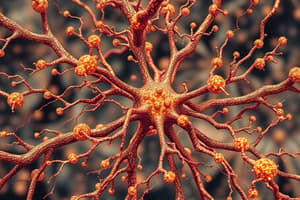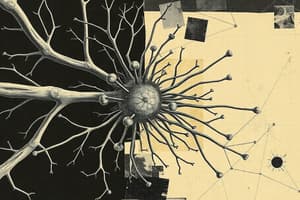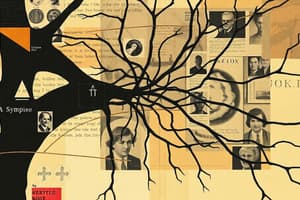Podcast
Questions and Answers
What is the primary cause of symptoms in Alzheimer's Disease?
What is the primary cause of symptoms in Alzheimer's Disease?
- Severe vitamin deficiencies
- Beta-amyloid protein binding to nerve cells (correct)
- Increased levels of dopamine
- Destruction of myelin sheaths
Which symptom is NOT typically associated with Multiple Sclerosis?
Which symptom is NOT typically associated with Multiple Sclerosis?
- Severe memory loss (correct)
- Slurred speech
- Numbness
- Blurred vision
Which treatment option is commonly used to manage seizures in epilepsy patients?
Which treatment option is commonly used to manage seizures in epilepsy patients?
- Cognitive behavioral therapy
- Anticonvulsants (correct)
- Radiation therapy
- Physical therapy
In which disease is the destruction of myelin sheaths primarily responsible for symptoms?
In which disease is the destruction of myelin sheaths primarily responsible for symptoms?
What is a characteristic feature of Parkinson's Disease?
What is a characteristic feature of Parkinson's Disease?
What happens to the tremors in Parkinson's Disease as the condition worsens?
What happens to the tremors in Parkinson's Disease as the condition worsens?
What is the treatment outlook for Multiple Sclerosis?
What is the treatment outlook for Multiple Sclerosis?
What aspect of epilepsy distinguishes it from other neurological disorders?
What aspect of epilepsy distinguishes it from other neurological disorders?
Which cognitive decline symptom is NOT typically associated with Alzheimer's Disease?
Which cognitive decline symptom is NOT typically associated with Alzheimer's Disease?
What causes cell death in the brain for Alzheimer's patients?
What causes cell death in the brain for Alzheimer's patients?
What is the function of calcium ions at the synapse?
What is the function of calcium ions at the synapse?
What distinguishes neurotransmitters from other chemical messengers?
What distinguishes neurotransmitters from other chemical messengers?
Which of the following describes the role of neuroreceptors?
Which of the following describes the role of neuroreceptors?
What occurs immediately after neurotransmitters bind to sodium channels in the post-synaptic membrane?
What occurs immediately after neurotransmitters bind to sodium channels in the post-synaptic membrane?
What is the role of synaptic vesicles in neurotransmission?
What is the role of synaptic vesicles in neurotransmission?
How is an action potential generated in the post-synaptic neuron?
How is an action potential generated in the post-synaptic neuron?
What happens to the neurotransmitter acetylcholine after it has performed its function?
What happens to the neurotransmitter acetylcholine after it has performed its function?
What is the synaptic cleft?
What is the synaptic cleft?
Which of the following is NOT a part of the synapse mechanism?
Which of the following is NOT a part of the synapse mechanism?
What process allows the breakdown products to be absorbed by the pre-synaptic neuron?
What process allows the breakdown products to be absorbed by the pre-synaptic neuron?
How does cocaine affect the dopamine transporter in the presynaptic neuron?
How does cocaine affect the dopamine transporter in the presynaptic neuron?
What is one of the consequences of prolonged cocaine use on the brain's reward circuit?
What is one of the consequences of prolonged cocaine use on the brain's reward circuit?
What happens to the synapse if neurotransmitters are not re-synthesized?
What happens to the synapse if neurotransmitters are not re-synthesized?
What effect does cocaine have on neurotransmitter levels in the synaptic cleft?
What effect does cocaine have on neurotransmitter levels in the synaptic cleft?
Among the following, which condition is associated with accelerated brain aging due to cocaine use?
Among the following, which condition is associated with accelerated brain aging due to cocaine use?
What motivates individuals to take stronger doses of cocaine over time?
What motivates individuals to take stronger doses of cocaine over time?
Which of the following diseases is NOT listed as a common brain disease?
Which of the following diseases is NOT listed as a common brain disease?
What primary energy source do mitochondria provide for neurotransmitter re-synthesis?
What primary energy source do mitochondria provide for neurotransmitter re-synthesis?
What psychological effects are associated with cocaine use when dopamine builds up in the synapse?
What psychological effects are associated with cocaine use when dopamine builds up in the synapse?
What type of disorder is characterized by repeated, unpredictable seizures?
What type of disorder is characterized by repeated, unpredictable seizures?
Which symptom is typically seen as an early manifestation of Alzheimer's Disease?
Which symptom is typically seen as an early manifestation of Alzheimer's Disease?
In which neurological disorder is the destruction of myelin sheaths most directly responsible for the symptoms?
In which neurological disorder is the destruction of myelin sheaths most directly responsible for the symptoms?
What is a treatment option that may reduce the frequency of seizures in epilepsy patients?
What is a treatment option that may reduce the frequency of seizures in epilepsy patients?
What neurotransmitter deficiency is primarily associated with Parkinson’s Disease?
What neurotransmitter deficiency is primarily associated with Parkinson’s Disease?
What is a common effect as Multiple Sclerosis progresses?
What is a common effect as Multiple Sclerosis progresses?
Which of the following is a potential treatment for seizure symptoms due to specific brain conditions?
Which of the following is a potential treatment for seizure symptoms due to specific brain conditions?
What is the typical progression of tremors in Parkinson’s Disease?
What is the typical progression of tremors in Parkinson’s Disease?
In Alzheimer's Disease, what cognitive function is primarily affected as the disease progresses?
In Alzheimer's Disease, what cognitive function is primarily affected as the disease progresses?
What symptom is commonly associated with Multiple Sclerosis that affects daily life?
What symptom is commonly associated with Multiple Sclerosis that affects daily life?
What sequence of events occurs first at the synapse when an action potential reaches it?
What sequence of events occurs first at the synapse when an action potential reaches it?
Which component of the synapse is responsible for carrying the nerve impulse across the synaptic cleft?
Which component of the synapse is responsible for carrying the nerve impulse across the synaptic cleft?
What occurs after neurotransmitters bind to their receptors on the post-synaptic neuron?
What occurs after neurotransmitters bind to their receptors on the post-synaptic neuron?
Which of the following processes directly follows the entry of calcium ions into the pre-synaptic neuron?
Which of the following processes directly follows the entry of calcium ions into the pre-synaptic neuron?
What is the role of the enzyme acetylcholinesterase in neurotransmission?
What is the role of the enzyme acetylcholinesterase in neurotransmission?
Which part of the synapse ensures that the neurotransmitter can bind to the post-synaptic neuron?
Which part of the synapse ensures that the neurotransmitter can bind to the post-synaptic neuron?
At which location would you find neuroreceptors in the synaptic transmission process?
At which location would you find neuroreceptors in the synaptic transmission process?
Which statement is true regarding the difference between impulse transmission at the synapse and along the axon?
Which statement is true regarding the difference between impulse transmission at the synapse and along the axon?
What might occur if there is an inhibition of acetylcholinesterase activity at the synapse?
What might occur if there is an inhibition of acetylcholinesterase activity at the synapse?
Which of the following components is NOT directly involved in the release of neurotransmitters?
Which of the following components is NOT directly involved in the release of neurotransmitters?
How does cocaine impact the re-entry of dopamine into the pre-synaptic neuron?
How does cocaine impact the re-entry of dopamine into the pre-synaptic neuron?
What primary function do mitochondria serve in the context of neurotransmitter re-synthesis?
What primary function do mitochondria serve in the context of neurotransmitter re-synthesis?
What consequence does prolonged cocaine use have on brain structure?
What consequence does prolonged cocaine use have on brain structure?
What is one psychological effect experienced by users when dopamine levels build up due to cocaine use?
What is one psychological effect experienced by users when dopamine levels build up due to cocaine use?
What adaptation occurs within the brain's reward circuits as cocaine use continues?
What adaptation occurs within the brain's reward circuits as cocaine use continues?
What mechanism prevents the synapse from being permanently activated after neurotransmitter release?
What mechanism prevents the synapse from being permanently activated after neurotransmitter release?
Which of the following is NOT a consequence of cocaine use on the brain?
Which of the following is NOT a consequence of cocaine use on the brain?
What initial effect does cocaine have on neurotransmitter levels in the synaptic cleft?
What initial effect does cocaine have on neurotransmitter levels in the synaptic cleft?
What behavior is commonly observed as individuals attempt to maintain the same effects from cocaine?
What behavior is commonly observed as individuals attempt to maintain the same effects from cocaine?
Which neurotransmitter is specifically affected by cocaine in relation to its transporter?
Which neurotransmitter is specifically affected by cocaine in relation to its transporter?
Flashcards
Synapse
Synapse
The junction between two neurons, a neuron and an effector, or a sensory receptor and a sensory neuron.
Synaptic knob
Synaptic knob
The tiny bulge at the end of a neuron's axon terminal containing neurotransmitter vesicles.
Synaptic cleft
Synaptic cleft
The small gap between the synaptic knob and the postsynaptic neuron.
Neurotransmitters
Neurotransmitters
Signup and view all the flashcards
Neuroreceptors
Neuroreceptors
Signup and view all the flashcards
Action potential
Action potential
Signup and view all the flashcards
Exocytosis
Exocytosis
Signup and view all the flashcards
Calcium ions in synapse
Calcium ions in synapse
Signup and view all the flashcards
Depolarization
Depolarization
Signup and view all the flashcards
Enzyme breakdown
Enzyme breakdown
Signup and view all the flashcards
Neurotransmitter reuptake
Neurotransmitter reuptake
Signup and view all the flashcards
Dopamine reuptake
Dopamine reuptake
Signup and view all the flashcards
Cocaine's effect on dopamine
Cocaine's effect on dopamine
Signup and view all the flashcards
Dopamine buildup effect
Dopamine buildup effect
Signup and view all the flashcards
Drug addiction adaptation
Drug addiction adaptation
Signup and view all the flashcards
Neurotransmitter synapse
Neurotransmitter synapse
Signup and view all the flashcards
Cocaine brain damage
Cocaine brain damage
Signup and view all the flashcards
Alzheimers Disease
Alzheimers Disease
Signup and view all the flashcards
Parkinson's Disease
Parkinson's Disease
Signup and view all the flashcards
Multiple Sclerosis
Multiple Sclerosis
Signup and view all the flashcards
Epilepsy
Epilepsy
Signup and view all the flashcards
Alzheimer's Cause
Alzheimer's Cause
Signup and view all the flashcards
Epilepsy Symptoms
Epilepsy Symptoms
Signup and view all the flashcards
Multiple Sclerosis Symptoms
Multiple Sclerosis Symptoms
Signup and view all the flashcards
Parkinson's Symptoms
Parkinson's Symptoms
Signup and view all the flashcards
Epilepsy Treatments
Epilepsy Treatments
Signup and view all the flashcards
Parkinson's Treatment
Parkinson's Treatment
Signup and view all the flashcards
What is a synapse?
What is a synapse?
Signup and view all the flashcards
What's in a synaptic knob?
What's in a synaptic knob?
Signup and view all the flashcards
What are Neurotransmitters?
What are Neurotransmitters?
Signup and view all the flashcards
What are Neuroreceptors?
What are Neuroreceptors?
Signup and view all the flashcards
How does an action potential travel across a synapse?
How does an action potential travel across a synapse?
Signup and view all the flashcards
How are neurotransmitters released?
How are neurotransmitters released?
Signup and view all the flashcards
How do neurotransmitters affect the postsynaptic neuron?
How do neurotransmitters affect the postsynaptic neuron?
Signup and view all the flashcards
How are neurotransmitters removed from the synapse?
How are neurotransmitters removed from the synapse?
Signup and view all the flashcards
What happens when neurotransmitters are not properly removed?
What happens when neurotransmitters are not properly removed?
Signup and view all the flashcards
Dopamine Transporter
Dopamine Transporter
Signup and view all the flashcards
Brain Adaptation to Cocaine
Brain Adaptation to Cocaine
Signup and view all the flashcards
Cocaine & Brain Aging
Cocaine & Brain Aging
Signup and view all the flashcards
Multiple Sclerosis (MS)
Multiple Sclerosis (MS)
Signup and view all the flashcards
What are the symptoms of Multiple Sclerosis?
What are the symptoms of Multiple Sclerosis?
Signup and view all the flashcards
What are the treatments for epilepsy?
What are the treatments for epilepsy?
Signup and view all the flashcards
Study Notes
Nervous System Organisation (Part IV)
- Previous parts covered the spinal cord, spinal and cranial nerves, somatic vs autonomic systems, action potential, and transmission along axons.
- This section focuses on the synapse, neurotransmitters, and diseases of the brain.
Synapse
- Nerve impulses travel between neurons across a small gap called a synapse.
- Synapses occur between two neurons, a neuron and an effector, or a sensory receptor and a sensory neuron.
- A synaptic knob is a bulge at the end of a presynaptic neuron's axon terminal. It contains vesicles with neurotransmitters.
- The synaptic cleft is the space between the synaptic knob and the postsynaptic neuron.
The Synapse (Detailed)
- A single neuron can have thousands of synaptic junctions on its dendrites and cell body.
- Synaptic knobs contain mitochondria and synaptic vesicles, which contain neurotransmitters.
- The pre-synaptic membrane is adjacent to the synaptic cleft and post-synaptic membrane, which has receptors for the neurotransmitters.
Synapse Function
- An action potential cannot cross the synaptic cleft directly.
- Neurotransmitters carry the impulse across the cleft.
- Neurotransmitters are produced by the presynaptic neuron and stored in synaptic vesicles.
- The neurotransmitters are released by exocytosis when calcium ions enter the presynaptic neuron following an action potential.
- Neurotransmitters diffuse across the synaptic cleft.
- The neurotransmitter binds to the neuroreceptors on the postsynaptic membrane.
- This binding opens ion channels, often leading to a change in the postsynaptic neuron's electrical potential.
Synaptic Events
- Voltage-gated calcium channels in the pre-synaptic neuron open when an action potential arrives. This allows calcium ions to enter the neuron.
- Calcium influx triggers the fusion of synaptic vesicles with the membrane, releasing neurotransmitters into the synaptic cleft.
- Neurotransmitters diffuse across the cleft and bind to receptors on the postsynaptic membrane.
- Receptor binding initiates a response in the postsynaptic cell.
Synapse Function (concluded)
- The neurotransmitter is broken down by enzymes in the synaptic cleft.
- The breakdown products are reabsorbed by the presynaptic neuron for reuse.
- This process prevents the synapse from being permanently active.
Neurotransmitters
- Various neurotransmitters exist, each with specific functions and locations in the brain and body.
- Examples like acetylcholine, serotonin, histamine, dopamine, epinephrine, norepinephrine, glutamate, GABA, and glycine are mentioned.
- Acetylcholine is involved in memory, while Serotonin and Histamine affect moods and sleep. Dopamine and Epinephrine are involved in emotions/moods and motor control.
Effects of Drugs on Synapses
- Drugs can affect neurotransmitter function at the synapse.
- Cocaine blocks the reuptake of dopamine, leading to higher levels in the synaptic cleft.
- This can have various effects, including euphoria and increased energy and arousal, but can also lead to a dopamine imbalance and addiction.
- Cocaine's impact on the aging of the brain is also noted.
Comparison of Axon and Synaptic Transmission
| Feature | Axon Transmission | Synaptic Transmission |
|---|---|---|
| Nature | Electrical | Chemical |
| Conduction | Travels along one neuron | Involves two adjacent neurons |
| Calcium | No | Yes (required for neurotransmitter release) |
| Depolarization | Only excitatory | Both excitatory and inhibitory |
| Time | Immediate | Synaptic delay (due to neurotransmitter release) |
| Action Potential | All-or-none response | Summation of action potentials may be needed |
| Recovery | Due to potassium efflux; sodium-potassium pump | Due to enzyme breakdown of neurotransmitters |
| Speed | Affected by axon diameter and myelin | Affected by drugs like curare |
| Transmission | Bi-directional | Unidirectional, from presynaptic to postsynaptic |
| Information transmission | Over a distance of 1 meter | Over a distance of 20 nanometers |
Diseases of the Brain
- Four common brain diseases are discussed: Alzheimer's disease, Parkinson's disease, multiple sclerosis, and epilepsy.
Alzheimer's Disease
- Progressive loss of mental function (loss of memory and confusion in older individuals).
- Gradual onset with symptoms like forgetfulness, irritability, lack of initiative, and inability to recognize loved ones.
- Cause is unknown, but likely involves damage caused by the protein beta-amyloid, which binds to nerve cells and causes cell death.
Multiple Sclerosis
- Caused by the destruction of myelin sheaths around nerve cells in the CNS.
- Leads to nerve cell death causing numbness, slurred speech, paralysis, temporary weakness, blurred vision, and difficulty controlling urination.
- Treatable but incurable.
Epilepsy
- Brain disorder characterized by repeated, unpredictable seizures or episodes of abnormal brain activity.
- Epilepsy can result from known medical conditions, brain injuries, or unknown causes.
- Seizures can often be treated with medication (anticonvulsants).
Parkinson's Disease
- Neurological disorder caused by a lack of dopamine in specific brain regions.
- Leads to progressive deterioration controlling movement, particularly involuntary movements like tremors in the hands and head.
- Treatable with drugs like levodopa, but the effects of the treatment may diminish over time.
Studying That Suits You
Use AI to generate personalized quizzes and flashcards to suit your learning preferences.





